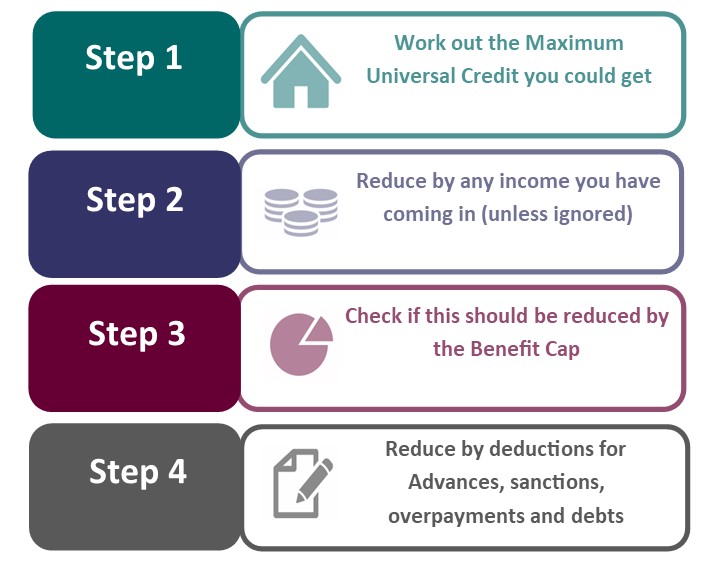TIP: Many workers are entitled to Universal Credit but don’t realise it. If you’re not sure whether you’ll be entitled or not, then speak to a Benefits Adviser – it is always worth checking to see if you could be entitled to Universal Credit.
How much Universal Credit you could get will depend on your personal and financial circumstances.

You will usually get one monthly payment to top up your income and help to cover your living costs.
See Getting paid for more information.
If you claim Universal Credit as a couple, you and your partner will get one payment for the two of you.
How much you get depends on your personal circumstances and income.
See How much overview for more information.
The Universal Credit award is made up of a basic ‘standard allowance’ and extra elements that might apply to you depending on your circumstances.
You might be able to get extra elements if you:
- look after one or more children
- work and pay for childcare
- need help with housing costs ie pay rent and/or certain service charges
- are disabled or have a health condition
- are a carer for a disabled person or you have a disabled child
- are entitled to transitional protection.
See Maximum Universal Credit for more information.
There are four steps to working out how much Universal Credit you will be paid:

If you are working
You can work and still get Universal Credit – your Universal Credit will reduce as you earn more. Your Universal Credit will usually go up if your job ends or you earn less.
See How does UC work for workers? for more information
If you’re self-employed, your payment might also be affected by how much the DWP expects you to earn each month – this expected amount is called your ‘Minimum Income Floor’. See What if I am self-employed? for more information
If you are working and paying for childcare you may be able to get help with childcare costs – see Help with childcare costs for more information
For more information on how much you may receive on UC see our How Much pages.
Example:
Dan is single, age 24 and lives in a one bedroom social housing flat with a rent of £110 per week.
He works in a call centre and his hours have just been cut – his net monthly wage will drop to £1,071.
If Dan makes a claim for Universal Credit, he will be entitled to £204.60 per month (before any deductions if applicable).
Example:
Jaz is 30 and lives with her 9 year old daughter in a two bedroom rented property (rent £145 a week). She’s been working full time but has lost her job and so has made a claim for Universal Credit. Jaz will be entitled to £1367.47 per month (before any deductions if applicable).